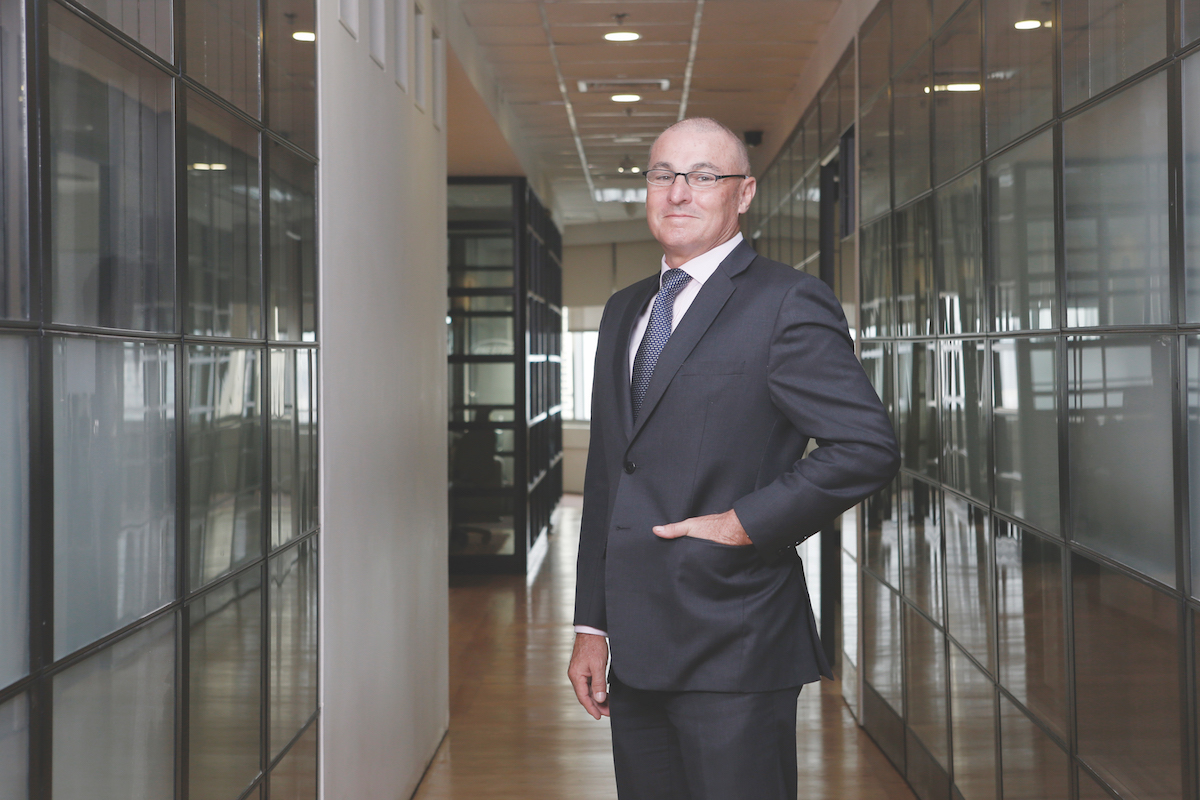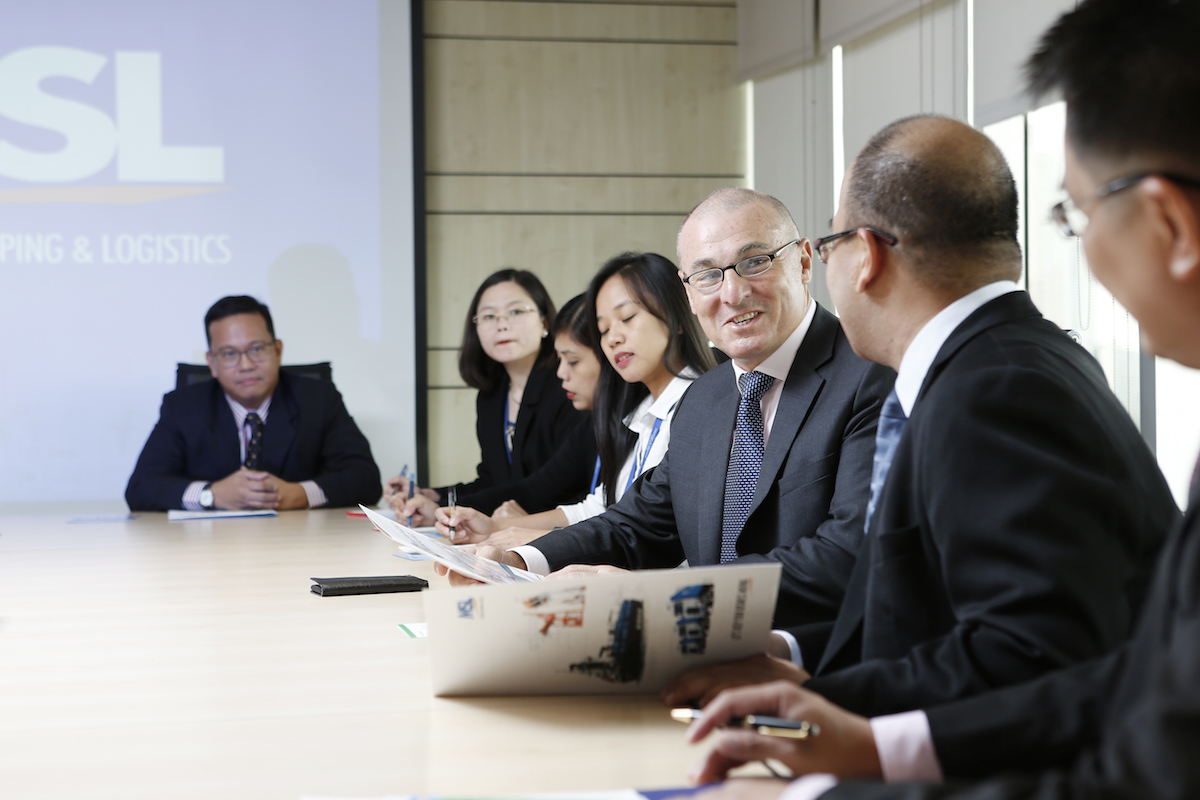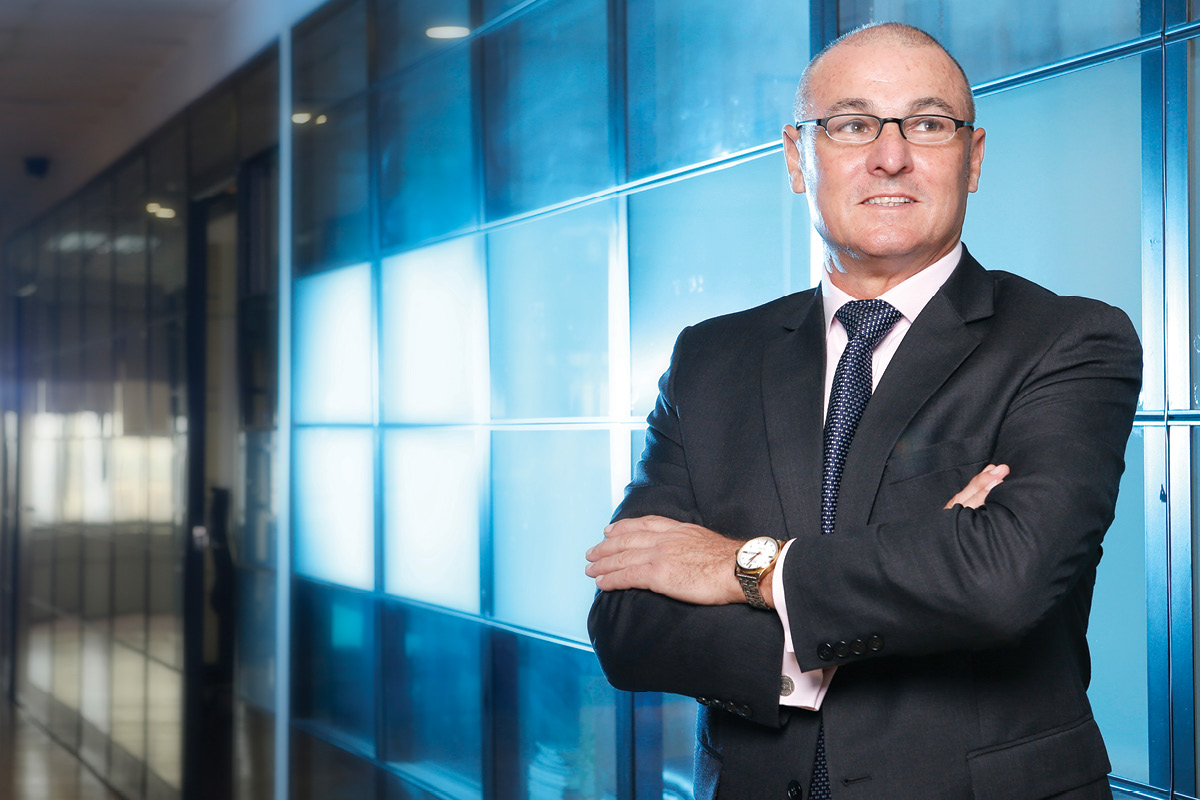For Magsaysay Shipping and Logistics Group CEO Ian Claxton, the long journey to his current role started with a fateful meeting at a careers fair. Having previously aspired to being either a vet or a pilot, he was so impressed by a veteran of the shipping industry and the excitement the older man conveyed that he became interested in a career at sea instead, signing up with the British Merchant Marine, where he completed an apprenticeship.
Ian spent some 16 years at sea, loving the maritime life and rising through the ranks to become Chief Officer and then Master on board a range of commercial vessels. He developed an extensive knowledge of safe and cost-effective container shipping and, in roles across Asia (India, Thailand, Singapore, Sri Lanka), built up an extensive knowledge of the Asian shipping sector.
This maritime experience made him a good fit for his current role at Magsaysay Transport and Logistics Group, one of the Philippines’ largest commercial shipping lines. The company owns and operates containers and tanker vessels, including both dry bulk and refrigerated container ships. It also has its own extensive warehousing and storage network, and is aiming eventually to own all stages of the supply chain in order to offer its clients an efficient, streamlined solution for all their shipping and logistics needs.
Ian Claxton tackles challenges in the shipping industry
Every industry has its own challenges, but they don’t get much more dramatic than the ongoing threat of piracy, which Ian has come to know all too well. In one of his previous roles, a dry bulk owner had a ship hijacked by pirates.
The crew were held hostage for some four months and suffered serious distress, before the authorities eventually negotiated their release. “This all happened in an area heavily patrolled and policed by several international naval forces,” Ian notes.
Operating in such a perilous environment, it is paramount that shipping companies cooperate, behave ethically, and even provide humanitarian support to their competitors when necessary. Ian says Magsaysay has a strong record of assisting other commercial ships in distress.
“I’m very proud to be associated with Magsaysay in this respect,” he says. “Time and again, despite pricing and profitability pressures, I’m reminded by the board that
our company’s reputation is not for sale. We treat our partners, customers and suppliers alike, with respect.”

When we negotiate, we always ensure it is a win–win to make the partnerships sustainable.
This respectful approach extends to every partnership. “When we negotiate, we always ensure it is a win–win to make the partnerships sustainable. We’re not in the business of squeezing the last penny out of vendors and leaving nothing on the table for them to enjoy. If you do that, the vendors won’t be with you for long.”
Regional considerations
While less headline-grabbing than piracy, congestion and a lack of transport infrastructure are ongoing challenges that many shipping companies in the Philippines face. It is not uncommon for ships to wait for days to berth at crowded ports and there are massive cost inefficiencies that result. Ian says there is a need to lobby government authorities for more investment in this space.
The lack of government intervention in commercial shipping does have its advantages in other aspects, however. “Asia is an attractive operating theatre in that it houses more potential for the development of trade and industry, and associated supply chains, than the more mature and highly regulated geographies of Europe and North America,” says Ian. “In those theatres, there is little room for innovation, whereas Asia, particularly developing Asia, offers challenges that bring immediate, recognisable reward to efficiencies, if met successfully.”
Challenges aside, Ian has embraced the lifestyle on offer in the Philippines’ National Capital Region. “I’m in love with the vibrancy of Asia and the Philippines, the passion of the people, and their acceptance of foreign ‘guests’ such as myself,” he enthuses. “It makes for an exciting and rewarding life experience. No two days are the same. I should also mention, the best golf courses in the world are found here in Asia, many of them in the Philippines.”
Magsaysay Transport and Logistics Group finds solutions through innovation
While logistics companies operating in the region have to liaise with authorities for access to infrastructure, Magsaysay is also seeking to optimise its own efficiency. It is always looking for innovations that can help it and its clients. One recent example of this is a business intelligence data-mining system which Magsaysay has implemented.
“It creates an environment where instantaneous opportunities can be offered to our customers, and booking and space reservations made while sitting in front of the customer,” Ian says of the new system.
Magsaysay has also modernised some of its tankers, which were originally designed for transporting dirty fuel oil. They have now been adapted to transport clean fuel and chemicals, and each tanker can house multiple clean commodities. The effect of this is twofold. First, it recognises a move towards the transportation of clean products. Second, it plays a role in helping customers meet their tonnage requirements.
Magsaysay has also worked to adapt and construct shipping containers to allow optimal use of its vans and reduce wastage on unused space. “These changes and adaptations show how we are constantly listening to our customers, identifying how best to help them ease their pain points, and upgrade our service offerings at the same time.”
Ian’s approach to management and work–life balance
Given his work is often concerned with optimising efficiency, it is perhaps unsurprising to discover that Ian has thought long and hard about time management and productivity, and how to make his own working day more streamlined. “Prioritising is a must, but difficult in these times of instant communications,” he says. “We can’t be all things at all times to everybody. We kill ourselves trying, so leaning back, taking a deep breath and not overcommitting our time is important.”

Ian has also identified when he is most productive. He begins work early and tries to fit in a workout every day, often after work. He begins his day by clearing his emails and dealing with any ideas that have occurred to him overnight, before moving on to new business reports and reading data.
Accepting that complications are bound to arise has also been beneficial. “Working in shipping and logistics, in a congested infrastructure, will always provide stress, and it’s good in one sense as it requires us to work with full levels of attention. The challenges are starting to become the norm, yet I find the older I get, the fewer surprises I see. Maybe that’s good in that I have plenty of prior experience to fall back on.”
Confessing to a healthy competitive streak, Ian says he thrives on a challenging workday. “I know the correct thing would be to say I live a clean, healthy life at all times but, frankly, how boring would that be? In any working day, I actually need stress, challenge and excitement with a little bit of humour thrown in to lighten the day, to function and make me want to get started.”
I know the correct thing would be to say I live a clean, healthy life, but how boring would that be?
Networking is another hugely important part of Ian’s role. “Working lunches tend to be the norm, but I’m okay with that. People tend to relax more over food and open their minds. I am a list keeper and so try to network according to a list to keep up to date on industry, customer, vendor and competitor issues.”
He will sometimes meet another industry player in the evening, although he aims to spend as many evenings as possible with his wife. “She is also a visitor to this country, and it’s interesting to get a non-shipping perspective; she brings me back to reality sometimes.”
Ian works with a strict open-door policy which, he says, encourages feedback and discussion. He sees his role as CEO as largely based around recognising the different strengths and experiences he has at his disposal, then being able to use these skills and provide recognition.
“I think emotional intelligence, or empathy, is very important. It’s not all touchy-feely; it’s about being fair but firm to get the best for and from our people. For me, people represent the most difficult, but also the most rewarding, part of management.”
Ian also advocates maintaining the ability to laugh at yourself or a situation, even when cultural differences make this difficult. “I have never been able to lose my sense of humour, which, as a Brit, is naturally based on sarcasm, though I do try to tone it down whenever possible, simply because it’s often not recognised or readily appreciated in either Asia or the Philippines.” Failing that, a world-class golf course is never too far away.



